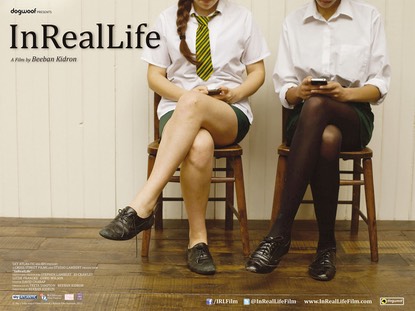Kathy McGuinness reviews InRealLife, a topical UK documentary that takes a frank look at teenage Internet use

Have we outsourced
our kids to the Internet? This is the ambitious opening question by director
Beeban Kidron (Bridget Jones: The Edge of
Reason) in her documentary on teenage Internet use in the UK InRealLife which opens
in cinemas nationwide this weekend.
This must-see snapshot of a generation raised on digital devices tackles the broad themes of cyber porn, gaming addiction, online bullying and the commercial exploitation of adolescents without ever seeming inflammatory or prurient.
The film thrusts no answers at its audience but offers a sobering picture of the reality of young people and the Internet, beautifully juxtaposing the cerebral and philosophical dreams of the original creators of the Internet with the prosaic realities of a contemporary teenager’s bedroom.
Dystopian dream
The metaphoric
framework of the film is constructed with menacing shots of the Internet’s miles
of wires and cables, under the sea and sprawling through futuristic urban data
centers. Kidron compares the concept of the Cloud (believed by the teenagers to
be somewhere above us in the sky, like heaven) to the huge, soulless, fortified
data hubs that connect us all and store our personal data for commercial use.
While Kidron deals with half a dozen storylines involving extreme cases of Internet use, we are reminded that these stories are far from unusual and in many cases are the norm:
The 15-year-old boy who reflects on how his Internet porn habit makes it impossible for him to love a real girl; the University student who lost his place at Oxford as a result of his online gaming habit who says there is “nothing else he would rather be doing”; the teenage girl who allowed herself to be sexually assaulted by a group of peers to get back her beloved Blackberry; the tragic case of a 14-year-old boy who was the victim of cyber-bullying.
These stories are thrown into sharp relief by interviews with commentators like Wikipedia founder Jimmy Wales, MIT professor Sherry Turkle, academic Clay Shirky and WikiLeaks' Julian Assange along with tech workers who monitor and make money out of Internet use. These talking heads reinforce Kidron’s central theme that an unregulated Internet flings our children at the mercy of big business, sacrificing them at the high altar of digital capitalism.
Love online
The final
storyline involves the tale of two gay adolescents who fall in love and
even contemplate marriage online without ever having met. They are persuaded to meet
‘in real life’ during the filming and the closing sequence shows them in a
touching embrace locking smart phones with a shared app that transfers each others' data.
All these individuals are sympathetically portrayed, highlighting the fragility, vulnerability and ultimate humanity of the protagonists. For all the talk of the brave new world of the Internet, human interaction is about people with all their defining shortcomings. This is poignantly balanced with the fighting talk of the Internet professionals and the naïve idea that the Internet is a wonderful utopia requiring no regulation or real-life rules.
The film throws up serious questions (perhaps too many to tackle in one feature) about how our children are living a digital experiment that we know very little about. With smartphones in their infancy and the Internet scarcely older than a teenager itself, this film inevitably asks more questions than it can answer. The final note that tech giants Google, Facebook, Twitter and Apple refused to cooperate during the filming of the documentary is an ominous message about the commercial power of the web.
The audience must balance Kidron's heavy critique of digital capitalism with the knowledge that people have always been at the mercy of uncaring corporations, although whether they have ever had such a grip on children is the central point of her documentary. Despite the disturbing message that a generation has been indelibly damaged, the message that we are resilient enough to adapt and seek out the humanity in every situation - however awful - is, ultimately, one of hope.
InRealLife opens in cinemas on 20
September with a nationwide screening and live satellite Q&A with Jon Snow,
Beeban Kidron and special guests at 1pm on Sunday 22 September. See inreallifefilm.com for more details and
participating cinemas.
